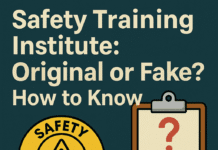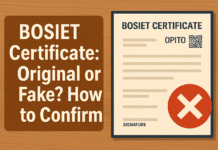
Safety Courses to Become Safety Officer 2024
The field of safety has undergone significant transformations, and as we step into 2024, the demand for qualified safety officers is higher than ever. Whether you’re considering a career change or looking to enhance your skills, investing in safety courses is a strategic move. In this comprehensive guide, we will explore the dynamics of safety courses, the evolving industry standards, and why 2024 is a pivotal year for aspiring safety officers.
Why Pursue Safety Courses in 2024
In the ever-changing landscape of occupational safety, staying updated with the latest standards is crucial. With 2024 marking a shift towards more stringent regulations, safety courses provide the knowledge and skills needed to navigate these changes effectively. The demand for certified safety officers is on the rise, presenting numerous career opportunities and avenues for professional growth.
Key Safety Courses in 2024
To become a proficient safety officer, it’s essential to enroll in courses that cover the foundational aspects of safety management. Courses offered by the Occupational Safety and Health Administration (OSHA), first aid and CPR certifications, and specialized training in hazardous materials management are integral components of a well-rounded safety education.
To become a safety officer in 2024, you'll likely need to undergo specific safety courses and obtain relevant certifications. The requirements may vary by country or region, so it's essential to check with local authorities or industry standards in your area. However, here are some general safety courses that are commonly pursued by individuals aspiring to become safety officers:- Occupational Health and Safety (OHS) Training:
- This course covers the fundamentals of workplace safety, including hazard identification, risk assessment, and control measures.
- NEBOSH (National Examination Board in Occupational Safety and Health):
- NEBOSH offers a range of globally recognized qualifications, such as the NEBOSH International General Certificate in Occupational Health and Safety (IGC).
- OSHA (Occupational Safety and Health Administration) Courses:
- OSHA provides various courses, including the 30-hour or 10-hour General Industry or Construction Safety and Health courses.
- IOSH Managing Safely:
- This is a widely recognized course that covers essential aspects of health and safety management. It’s suitable for individuals in supervisory or managerial roles.
- IOSH Working Safely:
- A basic level course designed for all employees to understand their role in maintaining a safe and healthy working environment.
- IOSH Safety for Executives and Directors:
- Tailored for senior executives and directors, this course provides an understanding of their health and safety responsibilities at a strategic level.
- IOSH Incident Investigation:
- Focuses on developing the skills needed to conduct thorough incident investigations, helping prevent similar incidents in the future.
- IOSH Construction Safety Courses:
- IOSH offers specialized courses for those working in the construction industry, such as the IOSH Managing Safely in Construction.
- First Aid and CPR Certification:
- Knowing how to administer first aid and CPR is crucial for a safety officer. Courses are often offered by organizations like the American Red Cross or St. John Ambulance.
- Fire Safety and Emergency Response Training:
- Understanding how to respond to fires and emergencies is a key aspect of safety. Look for courses that cover fire prevention, evacuation procedures, and emergency response.
- Environmental Management Courses:
- Some safety officers may also need knowledge of environmental management. Courses in environmental health and safety can be beneficial.
- ISO 45001 Certification:
- ISO 45001 is an international standard for occupational health and safety management systems. Obtaining certification in this standard can enhance your qualifications.
- Construction Safety Courses (if applicable):
- If you plan to work in the construction industry, consider courses specific to construction safety, such as the Construction Industry Training Board (CITB) courses.
- Risk Assessment and Management Courses:
- Courses on risk assessment and management are vital for a safety officer to identify and mitigate potential hazards in the workplace.
- Behavior-Based Safety Training:
- This type of training focuses on understanding and influencing employee behavior to enhance safety in the workplace.
Remember to stay updated on industry-specific regulations and standards, as they may evolve over time. Additionally, gaining practical experience through internships or on-the-job training can further enhance your skills as a safety officer.Accredited Institutions and Programs
Choosing the right institution for your safety courses is as important as the courses themselves. Reputable institutions with accredited programs ensure that you receive quality education. We’ll explore the notable institutions offering safety courses, along with insights into the various certification programs and their durations.
Online vs. Offline Learning
In the age of digital education, the debate between online and offline learning is ongoing. We’ll weigh the pros and cons of both approaches, shedding light on the benefits of traditional classroom settings and the flexibility offered by online safety courses.
Practical Training and Simulation
Safety is a hands-on field, and practical training is indispensable. We’ll delve into the importance of hands-on experience, coupled with simulations and real-world scenarios, to prepare aspiring safety officers for the challenges they may encounter in their careers.
Skill Development in Safety Courses
Beyond technical knowledge, safety courses play a crucial role in developing essential skills. Effective communication, attention to detail, and problem-solving abilities are just as important as understanding safety protocols. We’ll explore how safety courses contribute to a holistic skill set.
Industry-specific Safety Courses
Different industries have unique safety requirements. We’ll examine the tailored courses available for sectors such as construction, healthcare, and manufacturing. Specialized certifications ensure that safety officers are well-equipped to address industry-specific challenges.
Stay Updated: Emerging Trends in Safety Courses
As technology advances, safety training is also evolving. From incorporating artificial intelligence into safety programs to utilizing cutting-edge training methods, we’ll explore the emerging trends that will shape the future of safety courses.
Qualities of an Effective Safety Officer
Being a safety officer is not just about technical expertise. We’ll discuss the qualities that set successful safety officers apart, including strong communication skills, attention to detail, and effective leadership and decision-making abilities.
Importance of Networking and Professional Associations
Building a network within the safety industry is instrumental for career advancement. We’ll highlight the benefits of networking and joining professional safety associations, fostering connections that can contribute to long-term success.
Challenges and Solutions in Safety Training
While safety courses are crucial, they come with their own set of challenges. We’ll address common obstacles in safety training and explore innovative solutions that are shaping the future of safety education.
Conclusion
In conclusion, safety courses are the gateway to a fulfilling and impactful career as a safety officer. As we navigate the complexities of 2024, investing in your safety education is a strategic move that opens doors to a world of opportunities.
OSHA Safety Officer Certification
NEBOSH Safety Manager Requirements
IOSH Safety Manager Requirements
OSHA Safety Manager Requirements
NEBOSH Safety Engineer Requirements
Frequently Asked Questions (FAQs)
- Q: How long does it take to complete safety courses and become certified?
- A: The duration varies depending on the specific course and institution, but most programs can be completed within a few weeks to a few months.
- Q: Are online safety courses as effective as traditional classroom courses?
- A: Both online and offline courses have their merits. Online courses offer flexibility, while traditional classes provide hands-on experience. The choice depends on individual preferences and learning styles.
- Q: What industries have the highest demand for certified safety officers?
- A: Industries such as construction, manufacturing, healthcare, and oil and gas have a consistently high demand for certified safety officers.
- Q: Can safety courses be taken by individuals with no prior experience in the safety field?
- A: Yes, many safety courses are designed for beginners, providing a comprehensive introduction to the fundamentals of safety management.
- Q: How often should safety officers update their skills with additional courses?
- A: Staying updated is crucial in the dynamic field of safety. Safety officers are encouraged to participate in continuous learning and periodic refresher courses.





















